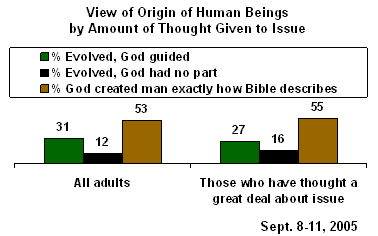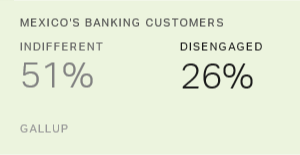GALLUP NEWS SERVICE
PRINCETON, NJ -- The debate about how human beings came to exist on Earth has simmered in American public discourse for a long time. Most Americans are engaged in the debate to some degree, according to a recent CNN/USA Today/Gallup poll -- three-quarters say they have thought at least a moderate amount about the origin of human beings, and two-thirds say it matters to them which theory about how human beings came to exist is correct. Americans are more likely to endorse a purely creationist view of the origin of humans than a purely evolutionary view or a view involving elements of both. Majorities of the public say evolution and creationism should be taught in public school science classes, while fewer believe intelligent design should be taught.
Basic Views About Origin of Human Beings
The Sept. 8-11 CNN/USA Today/Gallup poll asked Americans to choose from three explanations for the origin of man:
Which of the following statements comes closest to your views on the origin and development of human beings -- [ROTATED: human beings have evolved over millions of years from other forms of life and God guided this process, human beings have evolved over millions of years from other forms of life, but God had no part in this process, or God created human beings in their present form exactly the way the Bible describes it]?
Fifty-three percent say God created humans in their present form the way the Bible describes it, essentially endorsing a strict creationist explanation. Twelve percent endorse the strict evolutionary perspective -- that humans evolved from other species, but without any divine intervention. Thirty-one percent choose the modified perspective, believing human beings evolved from other species but with God guiding the process. That closely matches the perspective commonly known as "intelligent design."
Earlier Gallup polling shows similar results, with between 44% and 47% favoring the strict creationist viewpoint. Those questions, however, used slightly different question wordings that did not mention the Bible specifically as does the current wording. That may explain the higher support for creationism in the Sept. 8-11 poll. Nevertheless, in Gallup polling, the public has always been most likely to endorse creationist explanations for the origin of human beings.
That does not mean that Americans reject evolutionary theories. An Aug. 5-7 CNN/USA Today/Gallup poll asked Americans to rate whether each of the three theories were definitely true, probably true, probably false, or definitely false. Fifty-eight percent said creationism was definitely or probably true, but a majority, 55%, also said evolution was definitely or probably true. One in three Americans believe the evolution explanation is false. Fewer believe intelligent design is true, likely because a significant proportion of the public is unfamiliar with the term (28%, while an additional 9% did not have an opinion).
|
Views of Different Explanations for the Origin and Development of Life on Earth |
||||||
|
|
Probably |
Probably |
Definitely |
Not |
|
|
|
% |
% |
% |
% |
% |
% |
|
|
Creationism |
29 |
29 |
18 |
8 |
11 |
5 |
|
Evolution |
20 |
35 |
14 |
20 |
8 |
3 |
|
Intelligent design |
8 |
23 |
22 |
10 |
28 |
9 |
Majorities of Americans also believe that evolution and creationism should be taught in public school science classes -- in fact, more say evolution should be taught (61%) than say creationism should be taught (54%). Fewer than half say the same about intelligent design, again because many Americans are unfamiliar with that theory.
|
Should Different Explanations for Origin of Man |
||||
|
|
No, |
|
|
|
|
% |
% |
% |
% |
|
|
Evolution |
61 |
20 |
19 |
* |
|
Creationism |
54 |
22 |
23 |
1 |
|
Intelligent design |
43 |
21 |
35 |
1 |
|
* Less than 0.5% |
||||
Public Involvement in the Debate
It is unclear exactly how well Americans understand the different theories. The Sept. 8-11 poll attempted to gauge a sense of the public's involvement in the debate by asking how much they have thought about the different explanations, and how much it matters to them which is correct.
Forty-one percent of Americans say they have thought a great deal about these issues, with an additional 35% saying they have given a moderate amount of though to them. Less than one in four say they have not thought about it much (17%) or at all (6%).
Interestingly, people differ in the amount they have thought about human origin according to the view they most closely subscribe to. Among those who believe in evolution and say God had no part in the process, a majority (54%) say they have thought a great deal about how human beings came to exist. That compares with 43% of those who prefer the strict creationist view and 35% of those who believe man evolved with divine guidance.
|
Amount of Thought Given to Origin of Human Beings |
|||
|
Evolved, |
Evolved, |
Created as |
|
|
% |
% |
% |
|
|
Great deal |
54 |
35 |
43 |
|
Moderate amount |
31 |
49 |
29 |
|
Not much/Not at all |
11 |
15 |
19 |
Because the proportion of people who subscribe to the purely evolutionary view is small, the views of the group who have thought about the issue a great deal are not that different from the general public in their views about how humans came to exist on Earth -- 55% believe God created humans in their present form, 27% believe God guided the evolutionary process, and 16% believe God had no part in the evolutionary process.

Overall, 40% of Americans say it matters a great deal to them which theory is correct, and an additional 26% say a moderate amount. One in three Americans say it doesn't matter to them much (19%) or at all (14%).
While those who believe in the strict evolutionary view are more likely to say they have thought about the issues, they are least likely to say it matters to them a great deal. A majority of people who subscribe to the creationist view are much more likely to say it matters a great deal to them which is correct.
|
How Much Does it Matter to You Which Theory is Correct? |
|||
|
Evolved, |
Evolved, |
Created as |
|
|
% |
% |
% |
|
|
Great deal |
21 |
29 |
54 |
|
Moderate amount |
38 |
26 |
20 |
|
Not much/Not at all |
41 |
44 |
25 |
In general, then, people who adhere to the evolutionary view of the origin of humans are more likely to have thought a lot about the issue, but less likely to say it matters to them that their theory is right. People who adopt an orthodox creationist view are less likely to have thought a lot about the issue, but more likely to say it matters to them which is correct.
Past Gallup analyses have shown that people who believe in creationism are much more religious, and the fact that their religion and views of human origin are closely linked likely explains why they are so invested in which theory of the origin of human beings is correct.
Survey Methods
These results are based on telephone interviews with a randomly selected national sample of 1,005 adults, aged 18 and older, conducted Sept. 8-11, 2005. For results based on this sample, one can say with 95% confidence that the maximum error attributable to sampling and other random effects is ±3 percentage points. In addition to sampling error, question wording and practical difficulties in conducting surveys can introduce error or bias into the findings of public opinion polls.
36. Which of the following statements comes closest to your views on the origin and development of human beings -- [ROTATED: human beings have evolved over millions of years from other forms of life and God guided this process, human beings have evolved over millions of years from other forms of life, but God had no part in this process, or God created human beings in their present form exactly the way the Bible describes it]?
|
Evolved, God guided |
Evolved, God had |
God created |
OTHER (vol.) |
No opinion |
|
|
|
|
|
|
|
|
|
2005 Sep 8-11 |
31% |
12 |
53 |
1 |
3 |
|
(Vol.) = Volunteered response |
|||||
37. How much have you, personally, thought about these different explanations for how human beings came to exist on Earth -- a great deal, a moderate amount, not much, or not at all?
|
Great |
Moderate |
Not |
Not |
No |
|
|
|
|
|
|
|
|
|
2005 Sep 8-11 |
41% |
35 |
17 |
6 |
1 |
38. How much does it matter to you which of those theories is correct -- a great deal, a moderate amount, not much, or not at all?
|
Great |
Moderate |
Not |
Not |
No |
|
|
|
|
|
|
|
|
|
2005 Sep 8-11 |
40% |
26 |
19 |
14 |
1 |
39. Which comes closer to your view about the relationship between science and religion -- they generally agree with each other, they generally conflict with each other, or they are not related to each other in any meaningful way?
|
Agree with each other |
Conflict with each other |
Not related in a meaningful way |
No |
|
|
|
|
|
||
|
2005 Sep 8-11 |
24% |
35 |
36 |
5 |
